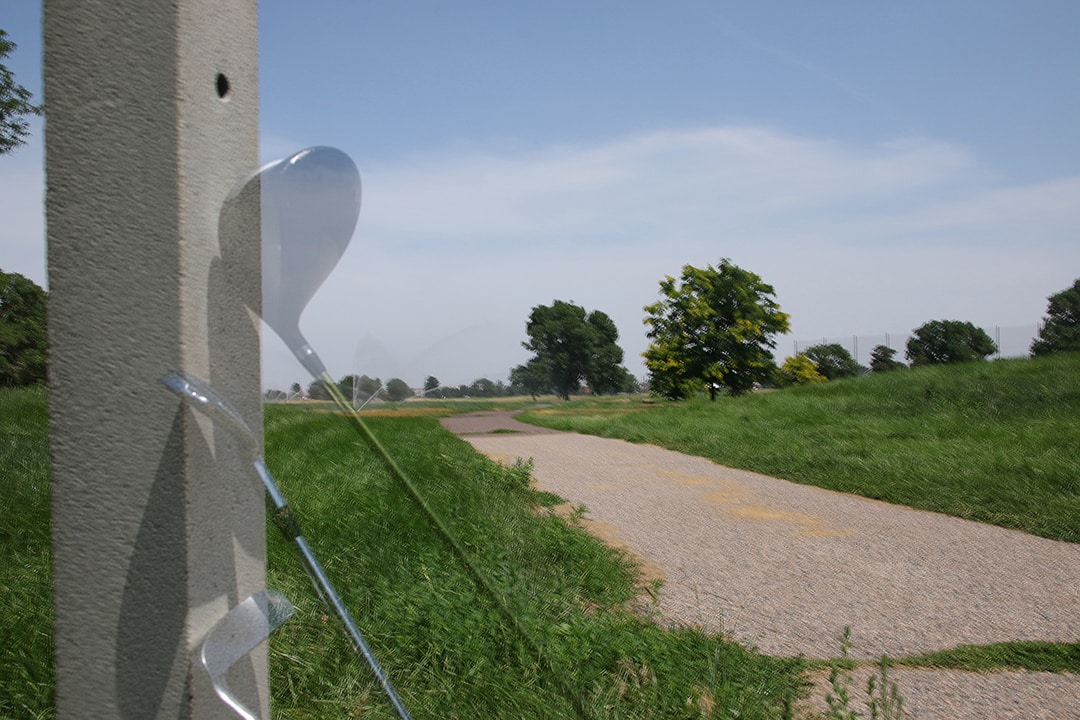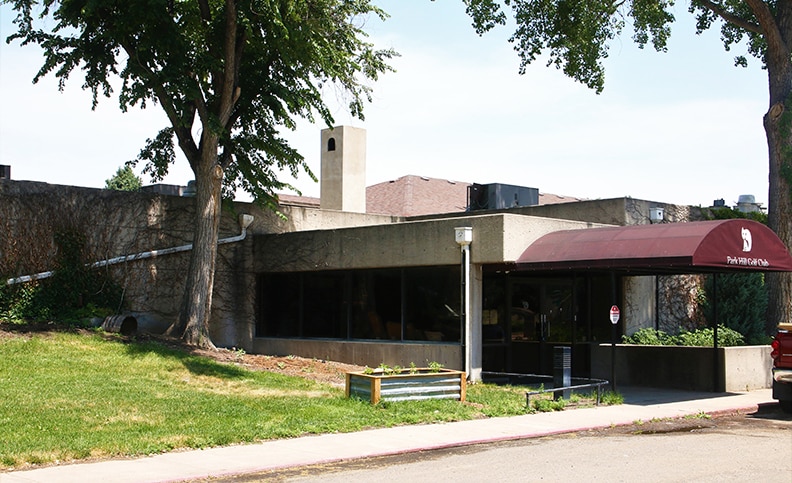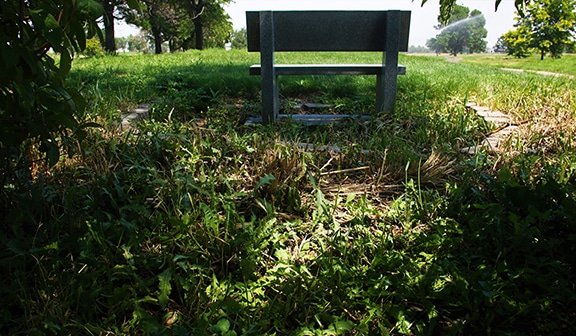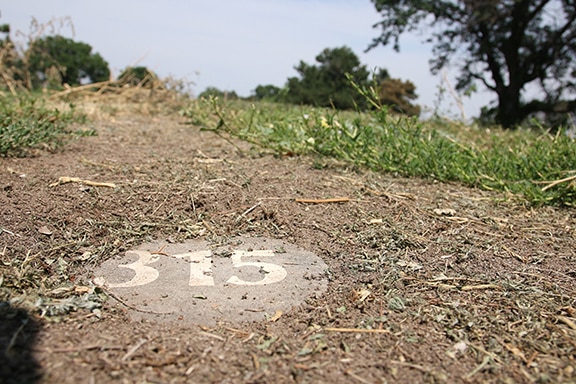
Park Hill Golf Club was an 18-hole course that operated from 1932 until 2018. The land was sold to Westside Investment Partners in 2019. (Eric Heinz photo illustration and photos)
It’s been two years since a former golf course in Denver’s Park Hill neighborhood sold to a Glendale-based development firm.
But all that’s been building is the controversy around the land.
That’s because of a six-page document that requires the area to be used as an 18-hole golf course. But it could theoretically be overturned by the Denver City Council with the help of a judge.
In recent months, the issue has prompted a lawsuit and the approval of dueling ballot measures that voters will decide in November. All the while, the city is leading sessions asking those who live by the course what they’d like to see replace it.
Here’s the latest in the saga:
The property
The former Park Hill Golf Club consists of 155 acres located between 35th and 40th avenues along Colorado Boulevard. The site was operated as a golf course from 1932 through 2018.
Prior to 2019, the land was owned by Clayton Early Learning, formerly known as Clayton Foundation.
The easement
According to the city of Denver, in 1997, Clayton needed more money to operate the golf course. The city negotiated a conservation easement agreement, paying Clayton $2 million in exchange for use of the land being restricted to a golf course that charged daily fees.
Denver Parks and Recreation officials told BusinessDen there are no other golf courses owned by the city with a conservation easement protecting the land.
In July 2019, months after the golf course ceased operating, Clayton sold the land to Westside Investment Partnersfor $24 million.
Through an agreement that same year, the city, wanting to keep control of the use of the land, agreed to pay Westside $6 million in exchange for a new but essentially similar easement.

The clubhouse and parking lot at the former golf course are still used by the community for various events.
According to that agreement, Westside has until late 2022 to come up with an alternative plan to the golf course through public outreach. Until then, the city will not enforce the provisions of the easement that require a golf course to operate there but the restrictions remain in place.
If Westside can’t convince the city the land should be used for something else, it will be required to restore a golf course and comply with the terms of the easement’s restrictions, according to the agreement.
According to city documents, the Denver City Council could lift the easement, but only if a district court judge allows it.
The developer
Westside is familiar with large tracts of land.
The company, founded by Andrew Klein, purchased the Loretto Heights campus in southwest Denver in 2018. And Westside also owns hundreds of acres out by Denver International Airport, where it has a deal in the works with Pepsi for a massive new bottling facility.
Kenneth Ho, a principal of Westside Investment Partners, said development of the former Park Hill course just makes sense.
“We have a significant housing crisis here,” Ho said. “The rest of the country is suffering from it as well because of zoning that limits us to single-family homes, which is not sustainable, equitable or affordable.”
Residents in the north and east Park Hill neighborhood have responded to surveys indicating they want more amenities than the current space provides. Ho said he understands why some people may not want things to change, but “a broader societal issue is going on.”
“Back in 1997 (when the easement was created), the Light Rail A Line didn’t exist, the population was 200,000 people fewer, and the agreement says (it) can be amended by the city and the landowner,” Ho said.
While the specifics of what Westside would develop haven’t been nailed down, Ho said the company is committed to keeping 60 acres as park space.
The developer partnered with The Holleran Group to create plans for the land. Currently, Westside and Denver are working on a visioning process for the area, but that planning is being challenged in court.
The lawsuit
In June, the organization Save Open Space Denver and various other plaintiffs — including former state Sen. Penfield Tate and former Mayor Wellington Webb — sued to keep the city from continuing with the planning phase of redevelopment of the course.
The argument is the city and Westside are spending taxpayer dollars on the planning efforts before the easement has been terminated.
Tate said he’s not opposed to building more affordable housing, but not on the Park Hill site, because it is the only open space in the neighborhood.
Tate said based on other large residential development tracts in Denver that have been built in the last 20 years, he does not think Westside will make good on its promise to include enough affordable housing.
“I’m cynical enough to believe that Westside is throwing affordable housing and the grocery store out there to try to build sympathy for the fact that they basically just want to pave over the land,” Tate said.

A memorial bench is surrounded by weeds behind the former No. 1 hole tee box at the former Park Hill Golf Club. The land is proposed for redevelopment but some residents would prefer that it become a park.
The ballot measures
Denver voters are slated to see two measures that relate to the Park Hill saga in November.
The committee Yes for Parks and Open Space wants to keep the Park Hill land as open space. That group filed a ballot measure that was certified in June that would block all commercial or residential construction on land designated as a park or that has a city-owned conservation easement, unless those projects receive voter approval. It would also ask whether Denverites would want to require a vote on whether to cancel any city-owned conservation easement, unless the termination was to create a new park.
As of June reports, Yes for Parks and Open Space has spent just over $33,000 on the campaign.
Then, last Tuesday, the Denver City Clerk/Recorder’s Office notified the political committee Empower Northeast Denver the ballot measure it’s backing, Conservation Easement, qualified for the Nov. 2 election as well.
That ballot measure intends to ask voters whether conservation easements in the city should only be defined as those that have been reviewed by the state and issued an income tax credit certificate, require voter approval before the city allows construction on parks and require voter approval to end a city-owned conservation easement.
But the ballot measure is framed so that Park Hill’s easement would not require voter approval.
The committee has spent just over $268,000 on the ballot measure, all of which was contributed by Westside and used for signature gathering.
If the Westside ballot measure or both measures pass, everything would remain the same. If only the Yes for Parks and Open Space ballot measure passes, then all development on the Park Hill land would have to be decided by voters.
Next Steps
A steering committee was established earlier this year to discuss what should be done with the Park Hill land, and it includes residents of the community and neighborhood organizations.
The steering committee last met Tuesday. There is a community workshop meeting hosted by the city scheduled for 6 p.m. Aug. 3, which will be held remotely.

Park Hill Golf Club was an 18-hole course that operated from 1932 until 2018. The land was sold to Westside Investment Partners in 2019. (Eric Heinz photo illustration and photos)
It’s been two years since a former golf course in Denver’s Park Hill neighborhood sold to a Glendale-based development firm.
But all that’s been building is the controversy around the land.
That’s because of a six-page document that requires the area to be used as an 18-hole golf course. But it could theoretically be overturned by the Denver City Council with the help of a judge.
In recent months, the issue has prompted a lawsuit and the approval of dueling ballot measures that voters will decide in November. All the while, the city is leading sessions asking those who live by the course what they’d like to see replace it.
Here’s the latest in the saga:
The property
The former Park Hill Golf Club consists of 155 acres located between 35th and 40th avenues along Colorado Boulevard. The site was operated as a golf course from 1932 through 2018.
Prior to 2019, the land was owned by Clayton Early Learning, formerly known as Clayton Foundation.
The easement
According to the city of Denver, in 1997, Clayton needed more money to operate the golf course. The city negotiated a conservation easement agreement, paying Clayton $2 million in exchange for use of the land being restricted to a golf course that charged daily fees.
Denver Parks and Recreation officials told BusinessDen there are no other golf courses owned by the city with a conservation easement protecting the land.
In July 2019, months after the golf course ceased operating, Clayton sold the land to Westside Investment Partnersfor $24 million.
Through an agreement that same year, the city, wanting to keep control of the use of the land, agreed to pay Westside $6 million in exchange for a new but essentially similar easement.

The clubhouse and parking lot at the former golf course are still used by the community for various events.
According to that agreement, Westside has until late 2022 to come up with an alternative plan to the golf course through public outreach. Until then, the city will not enforce the provisions of the easement that require a golf course to operate there but the restrictions remain in place.
If Westside can’t convince the city the land should be used for something else, it will be required to restore a golf course and comply with the terms of the easement’s restrictions, according to the agreement.
According to city documents, the Denver City Council could lift the easement, but only if a district court judge allows it.
The developer
Westside is familiar with large tracts of land.
The company, founded by Andrew Klein, purchased the Loretto Heights campus in southwest Denver in 2018. And Westside also owns hundreds of acres out by Denver International Airport, where it has a deal in the works with Pepsi for a massive new bottling facility.
Kenneth Ho, a principal of Westside Investment Partners, said development of the former Park Hill course just makes sense.
“We have a significant housing crisis here,” Ho said. “The rest of the country is suffering from it as well because of zoning that limits us to single-family homes, which is not sustainable, equitable or affordable.”
Residents in the north and east Park Hill neighborhood have responded to surveys indicating they want more amenities than the current space provides. Ho said he understands why some people may not want things to change, but “a broader societal issue is going on.”
“Back in 1997 (when the easement was created), the Light Rail A Line didn’t exist, the population was 200,000 people fewer, and the agreement says (it) can be amended by the city and the landowner,” Ho said.
While the specifics of what Westside would develop haven’t been nailed down, Ho said the company is committed to keeping 60 acres as park space.
The developer partnered with The Holleran Group to create plans for the land. Currently, Westside and Denver are working on a visioning process for the area, but that planning is being challenged in court.
The lawsuit
In June, the organization Save Open Space Denver and various other plaintiffs — including former state Sen. Penfield Tate and former Mayor Wellington Webb — sued to keep the city from continuing with the planning phase of redevelopment of the course.
The argument is the city and Westside are spending taxpayer dollars on the planning efforts before the easement has been terminated.
Tate said he’s not opposed to building more affordable housing, but not on the Park Hill site, because it is the only open space in the neighborhood.
Tate said based on other large residential development tracts in Denver that have been built in the last 20 years, he does not think Westside will make good on its promise to include enough affordable housing.
“I’m cynical enough to believe that Westside is throwing affordable housing and the grocery store out there to try to build sympathy for the fact that they basically just want to pave over the land,” Tate said.

A memorial bench is surrounded by weeds behind the former No. 1 hole tee box at the former Park Hill Golf Club. The land is proposed for redevelopment but some residents would prefer that it become a park.
The ballot measures
Denver voters are slated to see two measures that relate to the Park Hill saga in November.
The committee Yes for Parks and Open Space wants to keep the Park Hill land as open space. That group filed a ballot measure that was certified in June that would block all commercial or residential construction on land designated as a park or that has a city-owned conservation easement, unless those projects receive voter approval. It would also ask whether Denverites would want to require a vote on whether to cancel any city-owned conservation easement, unless the termination was to create a new park.
As of June reports, Yes for Parks and Open Space has spent just over $33,000 on the campaign.
Then, last Tuesday, the Denver City Clerk/Recorder’s Office notified the political committee Empower Northeast Denver the ballot measure it’s backing, Conservation Easement, qualified for the Nov. 2 election as well.
That ballot measure intends to ask voters whether conservation easements in the city should only be defined as those that have been reviewed by the state and issued an income tax credit certificate, require voter approval before the city allows construction on parks and require voter approval to end a city-owned conservation easement.
But the ballot measure is framed so that Park Hill’s easement would not require voter approval.
The committee has spent just over $268,000 on the ballot measure, all of which was contributed by Westside and used for signature gathering.
If the Westside ballot measure or both measures pass, everything would remain the same. If only the Yes for Parks and Open Space ballot measure passes, then all development on the Park Hill land would have to be decided by voters.
Next Steps
A steering committee was established earlier this year to discuss what should be done with the Park Hill land, and it includes residents of the community and neighborhood organizations.
The steering committee last met Tuesday. There is a community workshop meeting hosted by the city scheduled for 6 p.m. Aug. 3, which will be held remotely.

